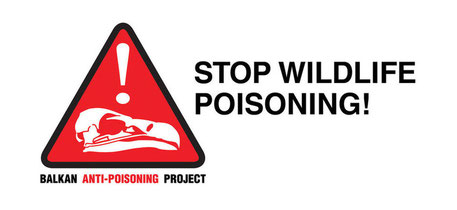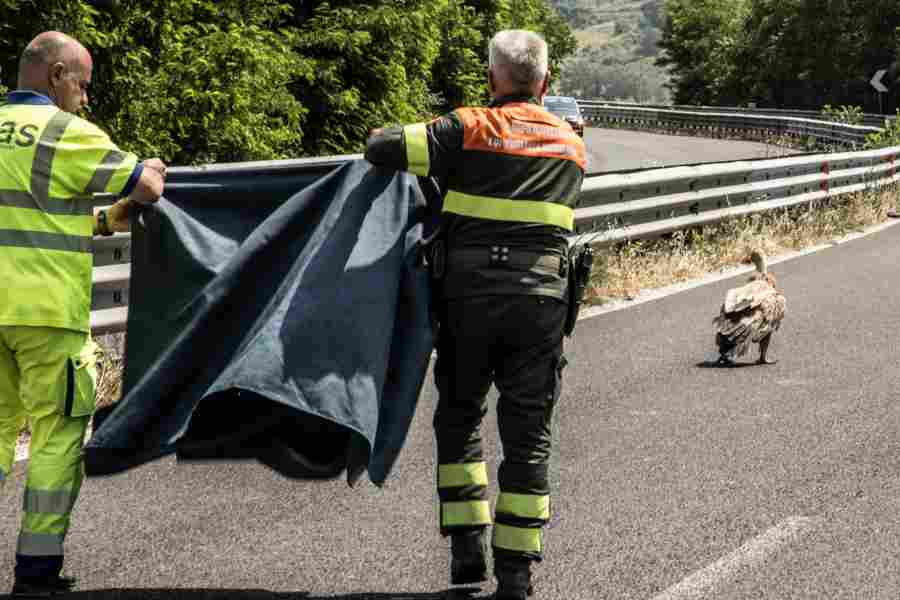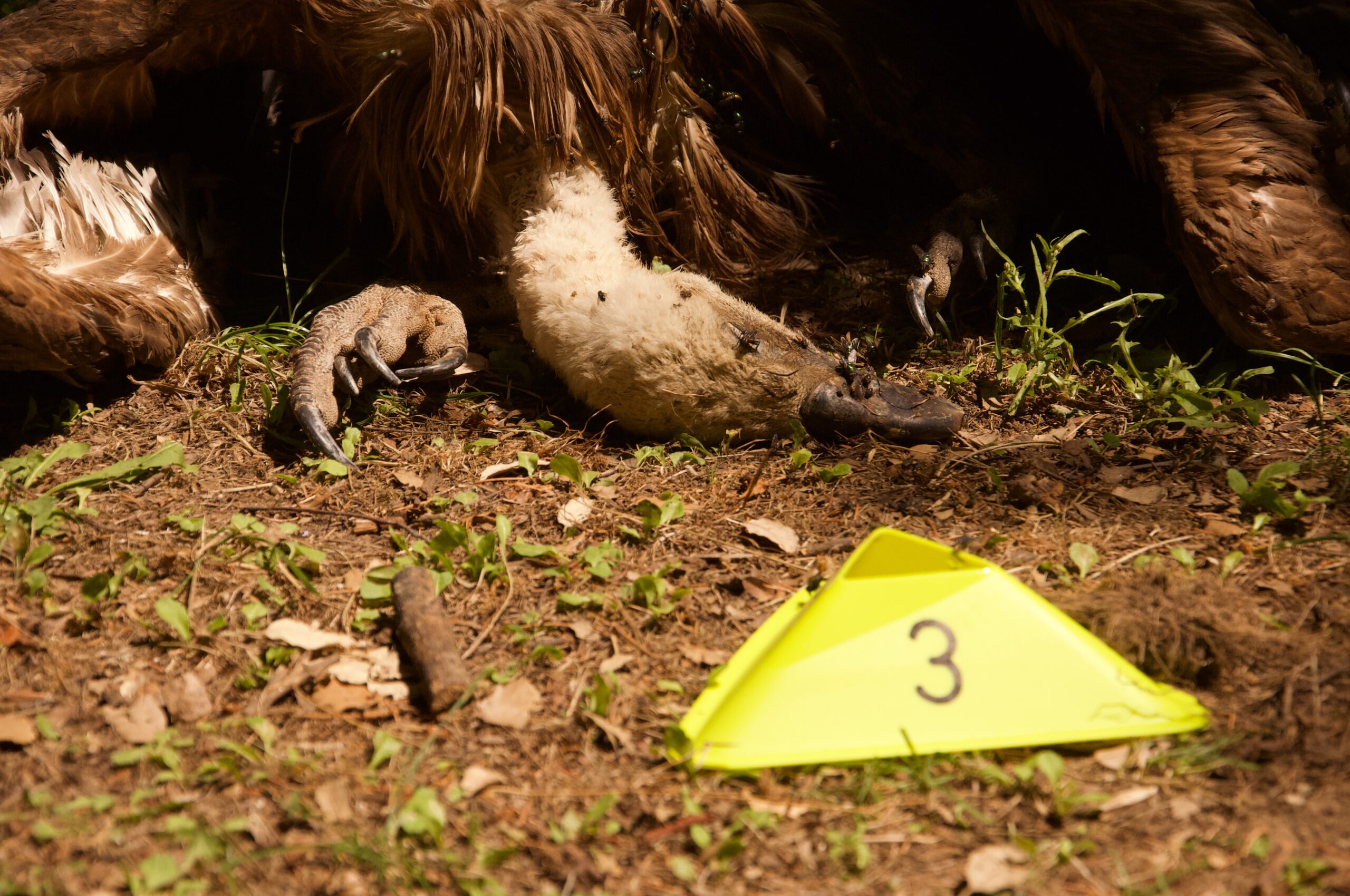
As part of the efforts to track poisoning incidents in the Balkans, our partners at Fund for Wild Fauna and Flora (FWFF) tagged several Griffon Vultures with GPS tags in Greece and the Republic of North Macedonia within the Balkan Anti-Poisoning Project Small Grants Programme, coordinated by us at the Vulture Conservation Foundation (VCF) and funded by the MAVA Foundation. We have been following their interesting movements for a few months now, and one of the birds even made it to the Middle East!

Griffon Vulture Giannis — Greece
FWFF equipped Griffon Vulture Giannis with rings and a GPS tag to be able to monitor the movements of the vulture in the wild. They then released Giannis in the Akarnanian Mountains, and the bird has been flying locally in Greece ever since.
Griffon Vultures Svetislav2 and Sunchica — North Macedonia
FWFF also tagged Svetislav2 and Sunchica, two more Griffon Vultures with GPS tags provided by the BAPP Small Grants, in North Macedonia. Svetislav2 and Sunchica were then released on 31 October 2019 in Berovo, North Macedonia, and have been exploring the surrounding regions.
Now, Svetislav2, is flying in Serbia, also in Uvac where there is a Griffon Vulture colony.
Sunchica, on the other hand, has travelled far and wide. Following his release in North Macedonia near Kavadarci, the vulture flew east, and in mid-November, he needed help. Possibly due to not finding food, the vulture was exhausted, so he was caught near Lake Vistonida in Greece and was transported to Thessaloniki in a vet centre. After he made a recovery, he was released at Dadia in December, and until the beginning of July 2020, he wandered in the Eastern Rhodopes between Dadia and the Bulgarian colonies. In mid-May, he approached the colony in North Macedonia where he was previously caught but did not find the nearby colony in the Kresna gorge Bulgaria and quickly returned to the Eastern Rhodopes. In early June, he went to Vrachanski Balkan and was making small excursions to Central Balkan until 3 October 2020, when he began migrating east.
Sunchica headed to the Black Sea, following the coast, and flew over Istanbul on 15 October, and then spent some time north of Ankara between 18 and 27 October. He then continued south-east and crossed to Iraq on 18 November, spending some time close to the border, passing Iraq before flying to Iran. Since mid-October, he travelled over 4,600 km!
The FWFF also tagged other Griffon Vultures within the scope of BAPP Small Grants that lost their tags, which were retrieved and will be reused to monitor the movements of other vultures soon.
Early Warning System for wildlife poisoning
To ensure reliable monitoring of bird behaviour and rapid response to poisoning incidents, a minimum of five transmitters working at a time in one vulture colony are required.
The FWFF has gained considerable experience first in responding to the case of Kresna Gorge, Bulgaria in March 2017, and subsequent application in the cases in Agrafa, Greece in 2018 and in Vrachanski Balkan, Bulgaria in 2019. The revolutionary use of transmitters as a tool for intensive monitoring and in-time control of threats to wildlife such as poisons and poaching has been described in a manual developed within the Vultures Back To LIFE project.
Five out of the six major vulture regions in the Balkans are already covered by the Early Warning System, with the number of vulture tagged steadily increasing with the help of donors such as LIFE, WFN, us here at the VCF and others.
The Balkan Anti-Poisoning Project Small Grants Programme
The Balkan Anti-Poisoning Project Small Grants Programme is the first time we at the Vulture Conservation Foundation have run a grant programme, and with this we aim to reinforce national capacities within relevant governmental authorities and conservation NGOs from six countries (Albania, Bosnia and Herzegovina, Croatia, Greece, North Macedonia and Serbia) of the Balkan Peninsula. This work will support those organisations to improve the skills and capabilities in the detection and mitigation of poisoning incidents through the implementation of previously developed National Roadmaps and Strategies. More specifically, through these small grants we endeavor to secure the implementation of priority anti-poisoning actions listed in the National Anti-Poisoning Road-maps/Strategies, strengthen the capacities of relevant national governmental institutions in combating the illegal use of poison baits, improve the enforcement of relevant legislation and attract other funding opportunities for implementation of large-scale anti-poisoning projects in the region. Through the support of the MAVA Foundation, we managed to dedicate a budget of €60.000 for these small grants.
Balkan Anti-Poisoning Project

The Balkan Anti-Poisoning Project is a cross-border initiative bringing together wildlife conservation organisations, governmental agencies and other stakeholder such as; hunting associations, farmers and scientists, in six Balkan countries to tackle illegal wildlife poisoning.
Funded by the Mava Foundation we aim to secure real and continued engagement of the relevant national governmental authorities in the Balkan region against illegal wildlife poisoning and increase their capacity to counteract it and working together to take positive steps to protect vultures.
The Balkan Anti-Poisoning Project is a partnership between us here at the Vulture Conservation Foundation and the Albanian Ornithological Society-AOS, Protection and Preservation of Natural Environment in Albania-PPNEA, Ornithological Society “Naše ptice”,Association BIOM, Hellenic Ornithological Society-HOS, Macedonian Ecological Society-MES, Društvo za zaštitu i proučavanje ptica Srbije.
The Balkan Anti-Poisoning Project also contributes directly into the implementation of the Vulture Multi-Species Action Plan by carrying out anti-poisoning actions in Albania, Bosnia and Herzegovina, Croatia, Greece, North Macedonia and Serbia, and is building on our work for the last decade in the Balkans through the Balkan Vulture Action Plan.
The BalkanDetox LIFE project now launched, as a continuation of the Balkan Anti-Poisoning Project.





